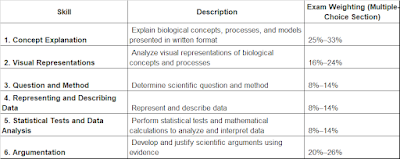What is AP Biology Exam?
AP Biology helps to cultivate understanding of the biology concepts among the students through inquiry or experiment-based investigations. It helps to better understand the theoretical concepts via practical experiments. The topics covered in AP Biology course includes: evolution, cellular processes, energy and communication, genetics, information
transfer, ecology, and interactions.
About College Board:
College board was founded in 1900 as a non-profit organization to connect students to colleges and expand access to higher level education to students. Today about 6000 colleges are affiliated to College Board which aim to provide world class education and facilities to the students.
Unit-5: Heredity
Exam Weightage based on Skills:
College Equivalent of AP Biology:
AP Biology course is equivalent to a two-semester college introductory biology course
for biology majors.
Prerequisites for AP Biology course:
Students should have successfully completed high school courses in biology and chemistry.
Laboratory requirements:
AP Biology course requires that 25 percent of the instructional time to be spent in hands-on
laboratory work, with an emphasis on inquiry-based investigations that provide students with
opportunities to apply the science practices.
Exam Weightage for each Units:
UNIT-1: Chemistry of Life
- Structure of Water and Hydrogen Bonding
- Elements of Life
- Introduction to Biological Macromolecules
- Properties of Biological Macromolecules
- Structure and Function of Biological Macromolecules
- Nucleic Acids
Unit-2: Cell Structure and Function
- Cell Structure: Subcellular Components
- Cell Structure and Function
- Cell Size
- Plasma Membranes
- Membrane Permeability
- Membrane Transport
- Facilitated Diffusion
- Tonicity and Osmoregulation
- Mechanisms of Transport
- Cell Compartmentalization
- Origins of Cell Compartmentalization
Unit-3: Cellular Energetics
- Enzyme Structure
- Enzyme Catalysis
- Environmental Impacts on Enzyme Function
- Cellular Energy
- Photosynthesis
- Cellular Respiration
- Fitness
Unit-4: Cell Communication and Cell Cycle
- Cell Communication
- Introduction to Signal Transduction
- Signal Transduction
- Changes in Signal Transduction Pathways
- Feedback
- Cell Cycle
- Regulation of Cell Cycle
- Meiosis
- Meiosis and Genetic Diversity
- Mendelian Genetics
- Non-Mendelian Genetics
- Environmental Effects on Phenotype
- Chromosomal Inheritance
Unit-6: Gene Expression and Regulation
- DNA and RNA Structure
- Replication
- Transcription and RNA Processing
- Translation
- Regulation of Gene Expression
- Gene Expression and Cell Specialization
- Mutations
- Biotechnology
Unit-7: Natural Selection
- Introduction to Natural Selection
- Natural Selection
- Artificial Selection
- Population Genetics
- Hardy-Weinberg Equilibrium
- Evidence of Evolution
- Common Ancestry
- Continuing Evolution
- Phylogeny
- Speciation
- Extinction
- Variations in Populations
- Origin of Life on Earth
Unit-8: Ecology
1. Responses to the Environment
2. Energy Flow through Ecosystems
3. Population Ecology
4. Effect of Density of Populations
5. Community Ecology
6. Biodiversity
7. Disruptions to Ecosystems
AP Biology Exam Format:
Section I: Multiple Choice
60 Questions | 1 hour 30 Minutes | 50% of Exam Score
- Individual questions
- Sets of questions with 4–5 questions per set
Section II: Free Response
6 Questions | 1 hour 30 Minutes | 50% of Exam Score
- There are 2 long questions and 4 short questions. Long questions are worth 8–10 points each; short questions are worth 4 points each.
- The long questions ask students to:
- Interpret and evaluate experimental results
- Interpret and evaluate experimental results with graphing
- The short-answer questions assess students’ understanding of the following:
- Scientific investigation
- Conceptual analysis
- Analysis of a model or visual representation
- Data analysis
Suggested Readings:






No comments:
Post a Comment